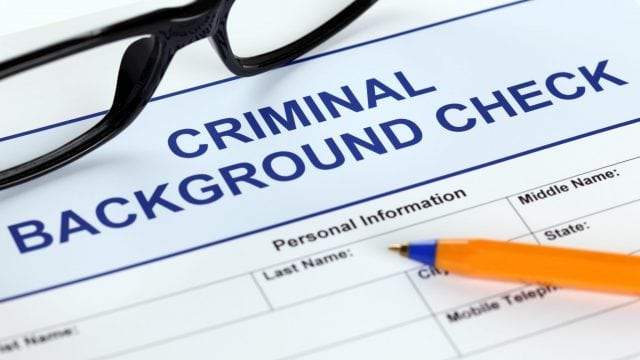 This complete guide on how to expunge your mental health commitment records in New Jersey has been created for those who are interested in expunging their voluntary or involuntary civil commitment records or determinations of dangerousness or incapacity.
This complete guide on how to expunge your mental health commitment records in New Jersey has been created for those who are interested in expunging their voluntary or involuntary civil commitment records or determinations of dangerousness or incapacity.
Mental health commitments often result in a mental health record that can stay with you for a lifetime. Unfortunately, society very often stigmatizes individuals who have been committed to mental facilities or institutions. These records, in turn, can prevent you from being able to obtain or possess a firearm or prevent you from obtaining a job that requires a certain level of clearance.
New Jersey’s law relating to the expungement of mental health commitment records was therefore enacted in order to remove any stigmas attached to individuals who have been committed to psychiatric hospitals. Thus, the mental health expungement provisions were designed to eliminate exposure to discrimination and were intended to return the petitioner to the same position he or she was in prior to the commitment.
Who can expunge their mental health records in New Jersey?
Mental health expungements in New Jersey are governed by statute, which are located at N.J.S.A. 30:4-80.8 to N.J.S.A. 30:4-80.11. These statutes set forth eligibility requirements for expungements of civil commitment records and allow for the expungement of records relating to:
- Involuntary civil commitments to a mental health institution or facility;
- Voluntary civil commitments to a mental health institution or facility;
- Determinations of dangerousness; and
- Incapacitation determinations pursuant to N.J.S.A. 3B:1-2.
Pursuant to N.J.S.A. 30:4-80.8, individuals seeking to expunge their commitments must demonstrate to the court either: 1) that they were discharged from the mental health institution or facility as “recovered;” or 2) that at the time of discharge or subsequently thereafter their illness has “substantially improved” or is “in substantial remission.” As can be seen, for purposes of expungement the applicable time period for proving that an individual falls under the second classification is at the time of the request for expungement, not at the time of their discharge from commitment.
What is the procedure for a mental health expungement in New Jersey?
Individuals seeking to expunge their mental health commitments must file a Verified Complaint for Expungement of Civil Commitment Record in the Superior Court of New Jersey, Law Division, Civil Part in the county in which they were committed. In order to prepare the Verified Complaint and prove eligibility for expungement, you will need to obtain:
- A copy of your entire civil commitment record;
- A copy of your entire mental health record;
- A copy of your criminal history record;
- A report and/or certification from a licensed psychologist or psychiatrist stating that you are not a danger to yourself, others, or property; and
- Evidence of your reputation in the community in the form of notarized letters of reference from employers, family members, and/or friends.
The Verified Complaint must then be filed with the Superior Court together with an Order to Show Cause, a proposed Expungement Order, a completed Civil Case Information Statement (“CIS”), the applicable court filing fee, and two self-addressed and stamped return envelopes. The current filing fee for a civil commitment expungement is $300.00 (in the form of a check made payable to the “Treasurer, State of New Jersey”).
After you file your mental health expungement pleadings with the court, the court clerk will thereafter return copies of your papers marked “filed” as well as the executed Order to Show Cause, which will set forth your hearing date and time. You must immediately (within 7 days from the date the Order to Show Cause was signed by the judge) serve one copy of the filed documents and the executed Order to Show Cause via Certified Mail Return Receipt Requested to each of the following:
- The county adjuster;
- The county prosecutor;
- The medical director of the institution where the petitioner was committed; and
- Any persons who applied for the commitment or determination.
After serving the applicable individuals and receiving the Certified Mail “green cards” back in the mail, you must also file Proof of Service with the Judge’s chambers, indicating that the requisite individuals were properly served, together with the original green cards, prior to your scheduled hearing.
At the hearing, the judge assigned to handle your case will decide whether or not you should be granted an Order expunging your mental health commitment record. You, as the petitioner, bear the burden of proving your entitlement to relief pursuant to the statutes — even if your application is unopposed.
In determining whether your request for expungement should be granted, the court will hear evidence as to each of the following:
- The circumstances surrounding your commitment or determination;
- Your entire mental health record;
- Your criminal history; and
- Your reputation in the community.
At the hearing, you must testify and/or present evidence as to each of the above factors. In addition, the court may or may not require that your psychiatrist appear in court and present testimony regarding your current mental health status.
If the judge grants your expungement, you will receive a copy of the Expungement Order signed by the court. Once you receive the Expungement Order, you must immediately serve a copy of the Expungement Order via Certified Mail Return Receipt Request on the County Adjuster.
What is the fee for expunging my civil commitment record with Katherine O’Brien Law, LLC?
At Katherine O’Brien Law, LLC, we pride ourselves on pricing transparency. The process to expunge a mental health record in New Jersey is complex and time-consuming. In addition to requiring the drafting of various legal documents (certifications, legal briefs, petitions, etc.), we must review and supply the court and an expert psychologist with all of the underlying commitment and treatment records. You will also need to supply various documents, such as character reference letters, degrees, diplomas, transcripts, the results of the recent criminal background check, and any other mitigating documents.
In addition, we will need to obtain a report and evaluation by a psychiatrist or psychologist. You and the mental health expert must both be present and testify at the hearing. These hearings usually last half of a day. Depending on the Judge, you may be able to testify remotely if you reside out of state.
At Katherine O’Brien Law, LLC, we charge a flat fee of $5,000.00 to represent you on your civil commitment expungement. If you have more than one commitment, there may be additional charges. Otherwise, this price is all-inclusive for our office’s work on your behalf. It does not, however, cover the fee that the psychologist/psychiatrist will charge you to review the underlying commitment and treatment records, perform an evaluation on you, draft a report to submit to the court and testify at your hearing. The fees you pay to the psychologist/psychiatrist for their work are separate and payable directly to those professionals.
What standard will be applied by the judge in determining whether my expungement should be granted?
In determining whether or not to grant an expungement application, the court must make two findings. If the court finds that the petitioner: 1) “will not likely act in a manner dangerous to the public safety;” and 2) that the granting of the expungement “is not contrary to the public interest,” then the court must grant the expungement application.
What is the effect of expungement?
Once the records relating to a commitment are ordered expunged, “the commitment shall be deemed not to have occurred and the petitioner may answer accordingly any questions relating to its occurrence.” N.J.S.A. 30:4-80.11. Thus, you are able to legally claim that you were not confined in a mental health facility of institution and anyone else (such as the police) must treat it as if it never happened.
What is the difference between a mental health expungement and a criminal record expungement?
In several ways, the expungement of mental health records is similar to the expungement of criminal records in New Jersey. There are, however, differences between the two. Unlike with the expungement of criminal records, it is not a crime for an individual or agency to disclose information regarding a person’s expunged mental health commitment record. Thus, there is little recourse to an individual whose mental health record has been expunged, but was wrongfully released to an individual or agency.
Unlike with the expungement of criminal records, however, which still requires the individual to disclose the expunged information when applying for a position within law enforcement, the judiciary, or corrections, there is no requirement that an individual disclose their expunged mental health records in those situations.
What if I have been disqualified from purchasing or possessing a firearm?
18 U.S.C. 922(d)(4) of the federal NCIS Improvement Amendment Act of 2007, Pub. L. 110-180 prohibits the sale of a firearm to a person who “has been adjudicated as a mental defective or has been committed to any mental institution.” If you have been disqualified from either purchasing or possessing a firearm under this section, however, an expungement of your mental health record will relieve you from any federal firearms disability.
New Jersey law similarly prohibits the sale, gift, transfer or disposal of a firearm to “any person who has ever been confined for a mental disorder.” N.J.S.A. 2C:58-3(c)(3). If you live in New Jersey and have been disqualified from obtaining a firearms identification card pursuant to N.J.S.A. 2C:58-3(c)(3), or denied purchase of a firearm, an expungement of your mental health commitment record will likewise relieve you from the disqualification.
It should be noted however, that even though a New Jersey applicant for a permit of FPIC may omit disclosure of a commitment, New Jersey law requires disclosure of mental health treatment. Pursuant to N.J.S.A. 2C:58-3(e), applicants for permits to purchase handguns or for a FPIC shall:
State whether he [or she] has ever been confined or committed to a mental institution or hospital for treatment or observation of a mental or psychiatric condition on a temporary, interim, or permanent basis, . . . [and] whether he [or she] has been attended, treated or observed by any doctor or psychiatrist or at any hospital or mental institution on an inpatient or outpatient basis for any mental or psychiatric condition.
Thus, as can be seen, the extent to the necessary disclosures extends beyond hospitalizations, which will be the subject of expungement under N.J.S.A. 30:4-80.8. Thus, even though a petitioner’s commitments have been expunged and will therefore not need to be disclosed, the inquiries required under New Jersey law for a firearm permit will require disclosure of all post-hospitalization psychiatric treatment, which may in turn preclude licensure.
How do I obtain a copy of my civil commitment record?
If you do not have a copy of your civil commitment record, you will need to contact the County Adjuster’s Office in the county where you were committed. The Adjuster will then advise you on what you need to do in order to obtain a copy of your records.
How do I obtain a copy of my mental health record?
You can obtain a copy of your mental health record directly from the facility or institution where you were committed. You will also need to request any mental health records regarding subsequent diagnoses and/or treatment from any subsequent treatment providers.
How do I obtain a copy of my criminal history?
Click here for instructions on obtaining a copy of your criminal history.
New Jersey Mental Health Expungement Lawyers
As can be seen, the requirements for mental health commitment expungements in New Jersey are challenging and complex. Thus, it is strongly advised that you consult with and retain an attorney if you are seeking to expunge your mental health records. The mental health expungement lawyers at Katherine O’Brien Law are experienced in representing individuals with their mental health record expungement applications in New Jersey. If you have further questions on how to expunge your mental health commitment record in New Jersey, schedule a free consultation today.







